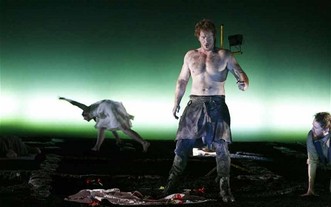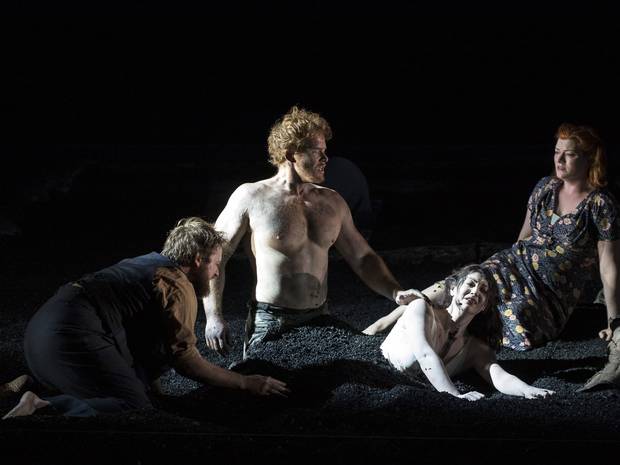 Duncan Rock who plays Tarquinius Duncan Rock who plays Tarquinius The Glyndebourne Festival is often thought of as the tip-top of everything that’s chic and exclusive about opera. With its country-estate setting, black-tie dress code, and picnics on the lawn, the summer Festival is a sumptuous experience even without the music. It can also be a little daunting, especially as the best seats are pricey. However, I saw Mozart’s ‘Marriage of Figaro’ there this summer and thoroughly enjoyed it. I was therefore delighted to be invited back to Sussex to review Benjamin Britten’s ‘The Rape of Lucretia’, one of the winter productions that is seen first in the famous opera house before going on tour. Not performed there since its debut in 1946, it was presented as part of a regular initiative to bring in a younger audience. And bear in mind that these ‘Glyndebourne on Tour’ productions have less formality and lower prices than the summer Festival, while maintaining high musical and theatrical standards. Under 30's at Glyndebourne Glyndebourne's under 30's scheme offers discount to those aged 16-29 to encourage the next generation of opera spectators and stop the perception of opera being only for older people. This includes:
Why go to an opera? A lot of my friends have said they would love go to an opera but they ‘probably wouldn’t understand what they are saying’. They need not fear, however, as there are ‘supertitles’ above the stage which act like subtitles in a movie. These are used even for productions sung in English, so you don’t miss a thing. There is a nice buzzing bar and a great atmosphere before and after the show too. The only disappointment I felt for the young’ns in this case was the very short interval which flew by. Some people moaned that they weren’t able to finish their drinks in time (of course, you were not allowed to bring the drinks into the theatre - rattling glasses and slurping lips might go unnoticed at a rock gig, but would be ruinous in an opera house!) Other than that, I heard no complaints from the newcomers. However, I saw a few older people tutting at some of the fidgety youngsters during the performance. I suppose it’s a price that might be worth paying if opera is to find a new generation to support it. ‘The Rape of Lucretia’ is about a group of men at an army camp outside Rome who all discover their wives have cheated on them while they were away. All except for Collatinus, whose wife Lucretia has remained faithful. One of the jealous men goads the single Tarquinius into going back to prove that Collatinus’ wife can be unfaithful too, insisting all women are whores (now that he has been cheated on of course!). When Tarquinius arrives, Lucretia is not interested in sleeping with him, so he forces himself on her. Lucretia tells Collatinus what happened. He insists it will not change their marriage, but Lucretia knows differently and the guilt and shame leads to a tragic ending for her.
A male and a female singer act as ‘chorus’ to commentate on the action from outside. Director Fiona Shaw decided to cast them as contemporary people. ‘A chorus represents us, the audience,’ she says. ‘They speak on our behalf. Very often a piece of theatre is a moral gauntlet, with the chorus saying to us “Step up here with us; what do you think of this story?”’ The opera examines how society judges people who do right, always waiting for them to slip up. The message came across and got everybody thinking and discussing this theme after the show. Britten wrote this opera just after the Second World War and Shaw feels “when Britten composed Lucretia, he himself had been feeling at odds with society, as a homosexual and as a pacifist.” I really felt the chorus not only helped explain the story, but also reinforced its impact. Both were very emotionally involved in the action although commentating from outside of it. In the rape scene, the chorus stripped their own clothes off, which added to it disturbing power. I felt very moved by the imagery particularly at the end as a spotlight lands on a spectacular image representing Jesus on the cross. Every actor’s performance and voice blew away both me and my guest. We both agreed we were particular fans of Duncan Rock (Tarquinius), who I had previously seen perform in a gay version of Mozart’s ‘Don Giovanni’ at Heaven nightclub in London! Want to know more about the opera tours? Find out about Glyndebourne and getting your opera tickets here Find out more about Shaw's take on directing the opera here What are your thoughts on opera? Let me know on FB or twitter Written by Sazrah @sazrah_producer www.facebook.com/sazrahproducer <-subscribe to my blogs here The Rape of Lucretia is at PLYMOUTH, THEATRE ROYAL (01752 267 222) 6 December Glyndebourne on Tour’s production of Donizetti’s L’Elisir d’Amore is at Plymouth 7 December and at STOKE-ON-TRENT, REGENT THEATRE (0844 871 7649) 11 and 14 December |
Author: SazrahSazrah is a UK music producer who has composed music for BBC 1xtra, Film, Catwalk and famous artists. Her blogs are about upcoming artists, music industry tips and general chit chat! Categories
All
Archives
September 2023
|

 RSS Feed
RSS Feed
